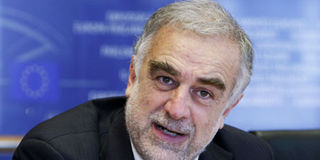ICC has ‘no witness in Kenya'

The International Criminal Court's (ICC) chief prosecutor Luis Moreno-Ocampo addresses the European Parliament Foreign Affairs Committee in Brussels March 23, 2010. Kenya is likely to be the next case at The Hague, the special advisor to the prosecutor at the International Criminal Court has said, as a US diplomat voiced support for the court. Photo/REUTERS
What you need to know:
Safety of those who saw crimes committed cannot be assured just yet, says Ocampo
Potential witnesses of the post-election violence will have to wait a while before they are accorded any official protection from the International Criminal Court.
ICC chief prosecutor Louis Moreno-Ocampo says they “do not have any witnesses in Kenya” until the court staff has interviewed them.
Mr Moreno-Ocampo was giving a briefing to visiting Kenyan journalists at the European Policy Centre in Brussels, Belgium.
The journalists had on Wednesday sought his response to safety fears expressed by potential witnesses who say that post-election violence (PEV) suspects have been intimidating them.
“I have no witnesses in Kenya. Until such a time as I have come over and interviewed anyone, I cannot say I have any. The protection of witnesses is the work of the Kenyan Government,” he added.
During the briefing, the special prosecutor said the ICC was also investigating human rights atrocities from Georgia to the Middle East.
Quite daunting
He stressed that the success of the ICC rested in the commitment of states to the Rome statute, and the observation of peace and justice.
Mr Moreno-Ocampo spoke of the two cases in Africa – Sudanese president Omar al-Bashir and Ugandan rebel leader Joseph Kony. He conceded that arresting a sitting head of State in any part of the world was a daunting task.
But it matters little whether they were arrested tomorrow or 10 years down the line, he said. “Milosevic was arrested when he was out of the office.”
Admitting that Kenya was the first independent case he intended to prosecute, he was optimistic that he would convince the pre-trial chamber judges that he had a case against the PEV suspects.
In an interview on the sidelines of the policy briefing, the prosecutor said the work of arresting people lay with governments. “My job is to prosecute, period.”
He said that the ICC would meet in Kampala in June to deal mainly with defining crimes of aggression and stock-taking. Mr Moreno-Ocampo was unanimously elected in New York as the first prosecutor of the ICC.
His mandate is to select and trigger investigations and prosecutions of the most serious crimes of concern to the international community – genocide, crimes against humanity and war crimes.




